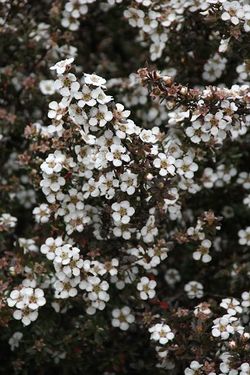Leptospermum Scoparium
Other Names : mānuka, manuka myrtle, New Zealand teatree, broom tea-tree, tea tree
See also : Manuka Honey
As the source of the world famous manuka honey, the manuka or Leptospermum scoparium tree is frequently considered to be the "tea tree" of Aotearoa New Zealand. A small, aromatic evergreen shrub native to all three islands that make up New Zealand, Leptospermum scoparium has been used medicinally by the country's indigenous Maori people for over 800 years.
Special Precautions of Leptospermum Scoparium
- Don't confuse with Kunzea Ericoides (Kanuka)
- Don't confuse with Tea Tree (Melaleuca alternifolia)
- The spasmolytic properties of the plant that make it inadvisable for use by pregnant or breastfeeding mothers.
- There is potential synergistic effect with bacitracin, cefadroxil, cephradin, and meropenem but an antagonist effect with ofloxacin, enoxacin, and sparfloxacin
- L. scoparium contains a lipophilic flavonoid that specifically interacts with benzodiazepine receptors (GABA-A receptor-chloride channel complex)
Health Benefits and uses of Leptospermum Scoparium are
Its antiseptic and antibacterial properties are well known to both folk medicine and science, although no single chemical constituent is said to be responsible for all of its properties. The compound methylglyoxal (MGO) has been identified as the chemical responsible for the majority of the tree's antimicrobial activity, leading to the development of a rating system for products based on their percentage of MGO content. Since a significant portion of research into the plant's antibacterial properties have focused on its essential oil, which contains no MGO, it is likely that a number of other compounds contribute strongly to its antibacterial action.
The essential oil contains a wide variety of potentially active ingredients, including α-pinene, β-pinene, α-farnesine, myrcene, ρ-cymene, 1,8-cineole, linalol, methylcinnamate, isoleptospermone and leptospermone as well as a number of different sesquiterpenes and triketones. This entire plant also contains a number of pharmacologically active flavonoids and triterpenoids, which may also moderate the action of Leptospermum scoparium's other constitutents. These also may be responsible for the spasmolytic properties of the plant that make it inadvisable for use by pregnant or breastfeeding mothers. Such muscle spasm reducing properties may explain its traditional use in easing the cramping and discomfort of diarrhea. Although its muscle relaxing properties are considered to be quite mild, the plant should not be used with benzodiazepine anxiety medications as the two can potentiate the activity of each other.
- Anti-dandruff: Dandruff is caused by a lack of moisture and oil in the scalp, degeneration of the scalp skin, and infections. Manuka oil can help you with all three of these causes. It will maintain the moisture and oil balance in the scalp, it will stop degeneration of the scalp skin, and will also fight any kind of infection on the scalp. You can access these benefits by mixing it with the bathing water or massaged on the head when blended with some other oil.
- Bite and Sting Antidote: In case of an insect bite or a venomous sting, quickly apply this oil to the affected spot and you will find that it will reduce pain and swelling in the spot and the situation will not get any worse.
- Antibacterial: This oil inhibits bacterial growth in the body, such as those giving rise to bacterial infections in the colon, urinary system, respiratory tracts and other vulnerable areas, while also helping to curb the bacterial attacks if they don’t prevent the actual growth.
- Anti-fungal: It is equally effective in eliminating fungal infections just as it is in case of bacterial infections. A very common fungal infection is running ears. A drop or two there and you will see the condition heal quickly, without spending exorbitant amounts of money.
- Anti-inflammatory: The Essential Oil of Manuka is anti-inflammatory in nature. It can efficiently handle inflammation of nearly any type; be it of nasal or respiratory tracts resulting from common colds or if it is of the digestive system caused by overeating of spicy food or even if it is of the circulatory system caused by any toxin (venom, narcotics etc.) getting into the blood stream. This essential oil heals inflammation for any other reason as well, including fevers and infections.
- Anti-histaminic: Histamine aggravates coughs and gives bad and exhausting coughs. People often try very strange combinations of medicines to control histamine. However, this oil quickly and easily reduces the production of histamine and thereby gives relief from these continuous coughs in a safe way.
- Anti-allergenic: Allergic reactions are nothing but hyper reactions of the body towards certain foreign elements, including pollens, dust, pets, and many others. Manuka oil calms down or sedates these hyper reactions, thereby giving relief from allergy issues.
- Cicatrisant: This oil helps the scars and after-marks on the skin fade away by promoting new cell growth in the affected parts of the body and protecting the wounds from developing any infections.
- Cytophylactic: Manuka oil promotes new cell growth and thereby promotes overall growth and the healing of wounds. It can be given to patients that have suffered heavy wounds after an accident or surgery.
- Deodorant: Manuka Oil drives away body odor and its fragrance creates a refreshing feeling. This is very effective in countering body odor during hot summers or when participating in physical activity.
- Relaxant: Manuka oil gives a relaxed feeling by fighting depression, anxiety, anger, stress, nervous afflictions, and disturbances. This is also good for hypertensive people whose blood pressure shoots up at the slightest anxiety or tension, thereby helping to protect the heart.
- Skin Health : This oil has varied effects on the skin. It can be used to cure itches, rashes, skin diseases, sores, chafing and other problems related with the skin, as well as to cure pain in the muscles and joints.
